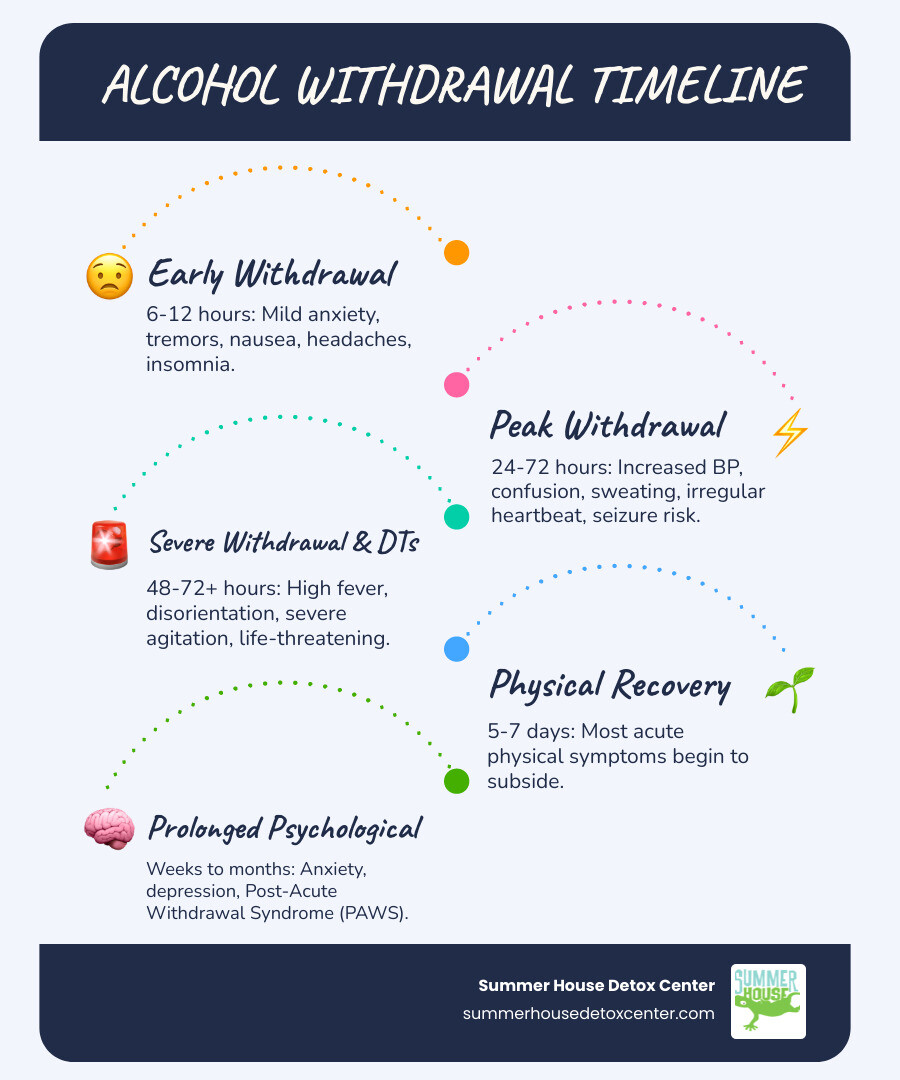Understanding Alcohol Withdrawal and What Lies Ahead
Alcohol detox stages are the phases your body goes through when you stop drinking after prolonged, heavy use. If you’re considering quitting, it’s normal to be worried about what’s next.
The Three Main Stages:
- Early Withdrawal (6-12 hours): Mild symptoms like anxiety, tremors, nausea, and headaches.
- Peak Withdrawal (24-72 hours): Moderate to severe symptoms, including confusion, high blood pressure, and potential hallucinations or seizures.
- Severe Withdrawal (48-72+ hours): Risk of Delirium Tremens (DTs), a life-threatening condition with high fever and severe confusion.
Timeline at a Glance:
- Symptoms can begin 6 hours after your last drink.
- The most intense symptoms occur between 24-72 hours.
- Physical symptoms usually subside within 5-7 days.
- Psychological symptoms may persist for weeks or months.
Alcohol Withdrawal Syndrome (AWS) occurs because your brain adapts to alcohol’s depressant effect on the central nervous system (CNS). To compensate, your brain produces more stimulating chemicals. When you stop drinking, this leaves your brain in a hyperactive state, causing withdrawal symptoms that are difficult and dangerous to manage alone.
You don’t have to go through this by yourself. In Miami and throughout Florida, medical detox centers like Summer House Detox Center provide safe, supervised care. While about 50% of people with alcohol use disorder experience withdrawal, and 3-5% develop severe DTs, the unpredictable nature of AWS makes professional care essential.
Your drinking history, age, and health all influence your withdrawal experience. This is why personalized medical care, available right here in South Florida, is so important for a safe detox.

Alcohol detox stages vocab to learn:
The 3 Key Alcohol Detox Stages: A Detailed Timeline
Knowing what to expect during the alcohol detox stages can help reduce fear. While the timeline is predictable, your personal experience will depend on factors like drinking history, health, and previous withdrawals. Medical professionals use the CIWA-Ar scale to measure symptom severity and tailor your care. This ensures you receive the right level of support at each moment. For more details, see our Alcohol Detox Timeline and Alcohol Abstinence Timeline.
Stage 1: Early Withdrawal (6-12 Hours After Last Drink)
The first stage begins 6 to 12 hours after your last drink. Symptoms often resemble a bad hangover but are the first signs of your central nervous system reacting to alcohol’s absence.
This early phase brings on mild symptoms, which can include:
- Anxiety and nervousness
- Insomnia despite exhaustion
- Nausea and vomiting
- Throbbing headaches
- Heart palpitations or a racing feeling in the chest
- Hand tremors (shakes)
Even though these symptoms are considered mild, they can escalate quickly. Medical supervision is recommended from the start, as the situation can change without warning.
Stage 2: Peak Withdrawal (24-72 Hours After Last Drink)
This is the most intense period of the alcohol detox stages, occurring 24 to 72 hours after your last drink. The risk of serious complications rises significantly, making professional care in a South Florida facility essential for many.
Early symptoms intensify, and new ones emerge. You may experience:
- High blood pressure
- Confusion and difficulty thinking clearly
- Profuse sweating
- Irregular heartbeat
- Hallucinations (seeing or hearing things that aren’t there), which can be terrifying.
- Seizures, which are a serious risk, most commonly occurring 24 to 48 hours into withdrawal.
This phase is when life-threatening symptoms are most likely to appear. If you experience confusion, hallucinations, or seizure activity, you need immediate medical attention. Our guide on the Top 8 Signs You Need Alcohol Withdrawal Treatment can help you recognize these dangers.
Stage 3: Severe Withdrawal & Delirium Tremens (48-72+ Hours)
The most dangerous stage can emerge 48 to 72 hours after the last drink and may last for several days. This is when Delirium Tremens (DTs), a life-threatening medical emergency, can develop.
Delirium Tremens involves severe confusion, agitation, and profound disorientation. A high fever can spike, creating a critical situation. While only 3-5% of people with AWS progress to DTs, the condition was once fatal in up to 20% of cases. With modern medical care, like that provided at Miami facilities such as Summer House Detox Center, the mortality rate has dropped to 1-4%. This improvement is only possible with professional treatment.
Severe withdrawal can also trigger other life-threatening complications like cardiac arrest or respiratory failure. This is why detoxing at home is so risky. The following table compares withdrawal severity:
| Symptom Category | Mild Withdrawal (CIWA-Ar 0-8) | Moderate Withdrawal (CIWA-Ar 8-15) | Severe Withdrawal (CIWA-Ar >15) & DTs |
|---|---|---|---|
| Anxiety/Mood | Increased anxiety, irritability | Pronounced anxiety, confusion | Severe agitation, disorientation, delirium |
| Physical | Headaches, insomnia, tremors, nausea | Increased blood pressure, rapid heart rate, fever | High fever, seizures, severe tremors, vomiting |
| Perceptual | Mild sensitivity to light/sound | Fleeting auditory/visual disturbances | Vivid hallucinations (auditory, visual, tactile) |
| Cognitive | Difficulty thinking clearly | Disorientation, impaired attention | Delirium, profound confusion |
| Key Risks | Discomfort, potential for escalation | Increased risk of seizures, progression to DTs | Delirium Tremens (life-threatening), cardiac events |
Understanding these stages makes it clear why 24/7 medical supervision is a necessity, not a luxury. For more on the timeline, visit our guide: Alcohol Detox: How Long Does It Take?
Why Unmanaged Withdrawal is Dangerous
Attempting to steer the alcohol detox stages without medical oversight is not just difficult—it can be deadly. In a social environment like Miami, it can be tempting to try and tough it out alone, but alcohol withdrawal is a medical event where willpower isn’t enough.
When the central nervous system becomes hyperactive after quitting alcohol, it can trigger severe medical complications:
- Seizures: These can strike without warning, typically 24 to 48 hours after the last drink, and can cause serious injury or death.
- Delirium Tremens (DTs): This severe condition has a mortality rate of 1-4% even with medical care. Without it, the odds are far worse.
- Cardiovascular Stress: Vomiting and sweating can lead to dehydration and electrolyte imbalances, causing dangerously high blood pressure, irregular heartbeats, and even heart failure.
- Aspiration Pneumonia: Inhaling vomit during severe nausea or a seizure can cause a life-threatening lung infection.
- Psychological Distress: Intense anxiety, panic attacks, severe depression, and suicidal thoughts are common symptoms that require professional treatment.
Trying to quit “cold turkey” is the most hazardous approach. Relapse rates are high for those who attempt to detox alone because the discomfort and danger become unbearable. Medically supervised detox isn’t a luxury—it’s a necessity for safety.
We cover these risks in detail in our articles The Importance of Medically Supervised Detox: Why DIY Detox Can Be Dangerous and Why Choose Alcohol Detox at Rehab vs. at Home Detox. In Miami, you have access to professional care that can prevent a dangerous ordeal and provide a safe start to recovery. You shouldn’t face the alcohol detox stages alone.
The Role of Medical Detox in Managing the Alcohol Detox Stages
Medical detox provides a safe, controlled environment where withdrawal symptoms are managed and dangerous complications are prevented. In Florida, accredited facilities like Summer House Detox Center in Miami offer evidence-based care to keep you safe and comfortable.
Medical detox acts as a safety net, providing:
- 24/7 Monitoring: Our experienced medical team, some of whom are in recovery themselves, constantly observes your condition to respond immediately to any escalation in symptoms.
- Symptom Management: We use carefully prescribed medications to alleviate the physical and psychological discomfort of withdrawal, making the process as comfortable as possible.
- Nutritional Support: We provide proper hydration, balanced meals, and vital vitamin supplements to help your body heal from the depletion caused by chronic alcohol use.
Medical detox is not just about surviving withdrawal; it’s about creating a stable foundation for long-term recovery. This supervised environment is the key to a safe alcohol detox treatment, as we explain in The Key to Experiencing a Safe Alcohol Detox.
Medications and Support Used During Detox
At Summer House Detox Center, our medical team tailors medications to your specific needs to ease discomfort and prevent complications.
- Benzodiazepines: Medications like Librium and Ativan calm the overactive central nervous system, reducing anxiety and preventing seizures.
- Anticonvulsants: Drugs like Keppra or gabapentin may be used for additional seizure protection.
- Beta-blockers: These help manage cardiovascular symptoms like high blood pressure and rapid heart rate.
- Nutritional Supplements: High-dose thiamine (Vitamin B1) is critical to prevent Wernicke-Korsakoff syndrome, a severe neurological disorder. We also replenish other vital nutrients and electrolytes.
- Other Medications: Anti-nausea medications combat gastrointestinal distress, while medications like Naltrexone and Acamprosate may be introduced after detox to help reduce cravings and support long-term abstinence.
Risk Factors Influencing the Alcohol Detox Stages
Your experience with the alcohol detox stages is unique. Several risk factors influence the severity and duration of withdrawal:
- Amount and Duration of Alcohol Use: Heavy, long-term drinking typically leads to more severe withdrawal.
- Co-occurring Disorders: Mental health conditions like anxiety or depression can amplify withdrawal symptoms.
- Age: Older adults may be at higher risk for complications.
- Previous Withdrawal History: Each withdrawal episode can be more severe than the last, a phenomenon known as “kindling.” If you’ve had seizures or DTs before, your risk is significantly higher.
- Overall Physical Health: Underlying conditions like liver or heart disease can worsen withdrawal.
Because of these factors, a thorough medical evaluation is essential. At Summer House Detox Center, we create a personalized detox plan to manage your specific challenges.
Life After Detox: Your Path to Lasting Recovery in Florida
Completing the alcohol detox stages is a monumental first step, but detox is just the beginning. As we explain in What Happens After Alcohol Detox?, continued treatment is essential to address the underlying reasons for drinking and build a foundation for lasting recovery.
Post-Acute Withdrawal Syndrome (PAWS) is a common challenge. For weeks or months after acute withdrawal, you may experience mood swings, anxiety, sleep problems, and cravings as your brain continues to heal. Understanding that this is a normal part of recovery is crucial.
Relapse prevention becomes the primary focus. This involves developing strategies to cope with triggers and stress. Therapies like Cognitive Behavioral Therapy (CBT) are effective for identifying negative thought patterns and developing healthier coping mechanisms. Individual and group therapy provide safe spaces for healing and connection.
Building a strong support network in the Miami and South Florida community is vital. Reconnecting with supportive family and engaging with peer groups can make a significant difference. A healthy lifestyle—including regular exercise, nutritious food, and stress management—also plays a huge role in creating a life you don’t want to escape from.
Miami and South Florida offer many resources to support your journey:
- Alcoholics Anonymous (AA): www.aa.org
- Al-Anon Family Groups: al-anon.org
- SMART Recovery: www.smartrecovery.org/
- National Institute on Alcohol Abuse and Alcoholism (NIAAA): www.niaaa.nih.gov
- Substance Abuse and Mental Health Services Administration (SAMHSA): www.samhsa.gov/substance-use/learn/alcohol
Recovery is a journey, not a destination. With continued effort and support from the recovery community here in Florida, a fulfilling, alcohol-free life is within reach.
Frequently Asked Questions about Alcohol Withdrawal
Facing the alcohol detox stages brings up many questions. Here are concise answers to some of the most common concerns we hear from people in your situation.
How long does alcohol withdrawal last?
Acute physical symptoms typically begin within 6-12 hours, peak at 24-72 hours, and subside within 5-7 days. However, psychological symptoms, known as Post-Acute Withdrawal Syndrome (PAWS), can linger for weeks or months. This may include anxiety, depression, and mood swings. The exact duration depends on individual factors like your drinking history, age, and overall health, which is why personalized care in our Miami facility is so beneficial.
How much do you have to drink to get withdrawal symptoms?
There is no specific amount that applies to everyone. Anyone with a physical dependence from regular, heavy drinking is at risk. This includes daily heavy drinkers and frequent binge drinkers. Factors like your body chemistry, age, and co-occurring health conditions influence your risk and the potential severity of withdrawal. The only way to know for sure is to consult a medical professional.
When should I seek professional medical help?
Immediately. If you plan to stop drinking after a period of heavy use, or if you are already experiencing withdrawal symptoms, you should seek professional help. Do not wait to see how bad it gets, as symptoms can escalate quickly.
Call 911 or go to an emergency room if you or someone else experiences severe symptoms like seizures, high fever, severe confusion, hallucinations, an irregular heartbeat, or chest pain. Here in South Florida, it’s common for people to try to handle it alone, but the risks are too high. A medical team like ours at Summer House Detox Center can ensure you detox safely and comfortably.
Begin Your Recovery Journey in Miami
You’ve learned about the alcohol detox stages and the importance of professional care. Now is the time to take the most important step: reaching out for help.

Navigating withdrawal alone is dangerous. The risk of seizures and life-threatening complications like Delirium Tremens makes professional care essential for your safety.
At Summer House Detox Center in Miami, our experienced team—many of whom are in recovery themselves—understands what it takes to reclaim your life from alcohol. We provide personalized care in a calm, comfortable environment where you can focus on healing.
You will receive 24/7 medical supervision, symptom-easing medications, and nutritional support to ensure you are safe and comfortable. In a vibrant city like Miami, having a dedicated, peaceful sanctuary is crucial for a successful start to recovery.
This is your moment to choose a healthier future. The decision to seek help is the bravest one you can make. We’re ready when you are.
Learn more about our Alcohol Detox program in Florida and find out how we can help you begin your recovery journey with confidence and hope.


